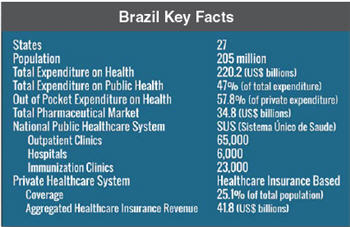Pharmaceutical Market Access In Brazil
By Davide Zaganelli, senior consultant and global market access manager, Alliance Life Sciences Consulting Group
 With expectations to reach 30 percent of the nearly $1.2 trillion U.S. global spend and 50 to 70 percent of the $70 billion annual U.S. growth forecasted in the pharmaceutical sector by 2016, it is clear why emerging markets are considered the new frontier. They are the new hope for a pharmaceutical industry that is seeking new strategies and partnerships to balance the stagnation in more mature markets.
With expectations to reach 30 percent of the nearly $1.2 trillion U.S. global spend and 50 to 70 percent of the $70 billion annual U.S. growth forecasted in the pharmaceutical sector by 2016, it is clear why emerging markets are considered the new frontier. They are the new hope for a pharmaceutical industry that is seeking new strategies and partnerships to balance the stagnation in more mature markets.
Today’s emerging markets — quickly growing, increasingly competitive, and culturally, socially, and economically diverse — defy a uniform approach and instead call for local business planning based on a comprehensive and global perspective. For this reason, international pharmaceutical companies must be willing to implement marketspecific strategies and local thinking within their global business strategy. Nevertheless, evolving political stances, increasing international competition, and rising local manufacturers are toughening market-access environments and creating new, and sometimes unexpected, risks for drug makers.
Brazil is one of many examples showing how quickly business conditions for drug makers are changing and how important it is to identify, evaluate, and foresee such changes as early as possible to improve and consolidate market positioning. This article provides an overview of the latest trends regarding pharmaceutical taxation, strategic partnerships, and generics promotion.
Latest Reforms and New Challenges
With over $220 billion of healthcare expenditure, a strong economic growth, and drug prices adjusted annually (2.7 to 6.31 percent increase estimated in 2013), Brazil is destined to become the third-largest pharmaceutical market by 2020 after the U.S. and China.
Despite its strong economic growth, Brazil faces increasing pressure to control healthcare expenditures and, at the same time, promote innovation and improve access to healthcare. Pursuing this difficult task, decision makers are discussing several initiatives, some of them already converted into law, which will reshape the pharmaceutical market in the following years. In a context of increasing competition and stricter regulatory hurdles, Brazil will become a much more challenging business environment.
Decreasing Taxations on Pharmaceuticals
Even though international companies operating in the Brazilian healthcare market are approximately 20 percent of the total healthcare manufacturers based in Brazil, they represent 75 percent of market share.
Decreasing taxation on medicines for human use is seen as an effective way to promote and incentivise over 550 laboratories that represent the internal pharmaceutical sector. Two different measures adopted in the last six months confirm this strategy:
On Nov. 28, 2012, the Brazilian Committee on Constitution, Justice, and Citizenship approved a replacement bill proposing a constitutional amendment that would prohibit the collection of taxes on medicines for human use. Import taxes, however, will remain in place as it was recognized that “the import tax serves as an instrument of government economic policy, which should continue providing the flexibility to maneuver its rates and the need to protect the domestic market from indiscriminate entry of foreign products.”
More recently, on March 13, 2013, a taxdeferral measure was officially published to suspend goods-circulation taxes in the state of São Paulo for domestic products and imported pharmaceutical ingredients or intermediate drug products purchased by the Foundation of Popular Medicines (Fundação para o Remédio Popular). The Foundation is linked to the São Paulo department of health and is responsible for developing, producing, and distributing pharmaceutical products in Brazil. This rule is valid for imported generic or biosimilars not yet available in the country.
Seeking New Partnerships
Brazil recognized that the development of technology in healthcare is necessary to strengthen national industrial manufacturing, reduce dependency on product importations, and achieve better control over expenditure. To date, 34 technology transfer partnerships between public and private laboratories have been established for the production of 28 drugs (including Pramipexole, Tenofovir, Clozapine, Quetiapine, Olanzapine, Tacrolimus, Rivastigmine, and Donepezil), and 3 vaccines. According to the Ministry of Health, at least 20 new partnerships are expected over the next four years, including biological products and medical devices.
 In the medium and long term, stakeholders are not only seeking internal development, but they are also hoping to increase competitiveness of Brazilian pharma companies abroad. A further step in this direction was made early this year when the Brazilian president, Dilma Rousseff, announced that the recently created Brazilian Enterprise for Research and Industrial Innovation (Embrapii) will be responsible for promoting partnerships between public innovative research institutions and private companies to create new products and processes.
In the medium and long term, stakeholders are not only seeking internal development, but they are also hoping to increase competitiveness of Brazilian pharma companies abroad. A further step in this direction was made early this year when the Brazilian president, Dilma Rousseff, announced that the recently created Brazilian Enterprise for Research and Industrial Innovation (Embrapii) will be responsible for promoting partnerships between public innovative research institutions and private companies to create new products and processes.
Increasing Generics Market Share
Generics were introduced in Brazil 30 years ago with distrust from both general consumers and prescribers. Nowadays, the generics market share in Brazil is still lower than in other markets (e.g. 26 percent in 2012 compared to 66 percent in Germany and 60 percent in the United Kingdom and U.S.), but it is expected to increase to 45 percent by 2020. According to the Pro-Generics Association, by the end of this year the market share of generic drugs should increase to 30 percent.
Trying to capitalize on this broad and increasing interest from decision makers, the generic drugs industry is proposing that new generic drugs, such as those whose patents have expired and do not have other generic competition in market, should be granted priority by ANVISA (National Health Surveillance Agency Brazil) in order to decrease regulatory time for authorization and increase access to healthcare. The prominent players in Brazil’s generics market are Brazilian companies Medley, EMS Sigma Pharma, Eurofarma Laboratórios, and Aché Laboratórios Farmacêuticos and Indian multinational Ranbaxy Laboratories Ltd.
What Does this Mean for Your Company?
In the coming years, the favorable healthcare environment will allow local companies and generic drug makers to rapidly increase their market share and negatively impact on international manufacturers of branded products. Moreover, key decision makers are expected to adopt stricter regulatory, pricing, and reimbursement regulations to further develop internal pharmaceutical manufacturing.
As a direct consequence, market access in Brazil will become increasingly challenging for international pharmaceutical companies, making it necessary for global businesses to evaluate and adapt their business strategy to local realities. Strategic offerings, including technology transfer agreements, will be a key factor to secure continued market sales growth in the following years. International pharmaceutical companies should also consider financial/outcome-based pricing agreements and other alternative approaches to meet the increasing demand for access to healthcare without impacting excessively on budget.
Keeping track of legislative, pricing, and reimbursement changes; foreseeing how competitors’ launches will impact your portfolio; and linking Brazil to global decisions and international referencing pricing are essential to identifying and bending gaps and trends shaping the pharmaceutical market in your favor.
